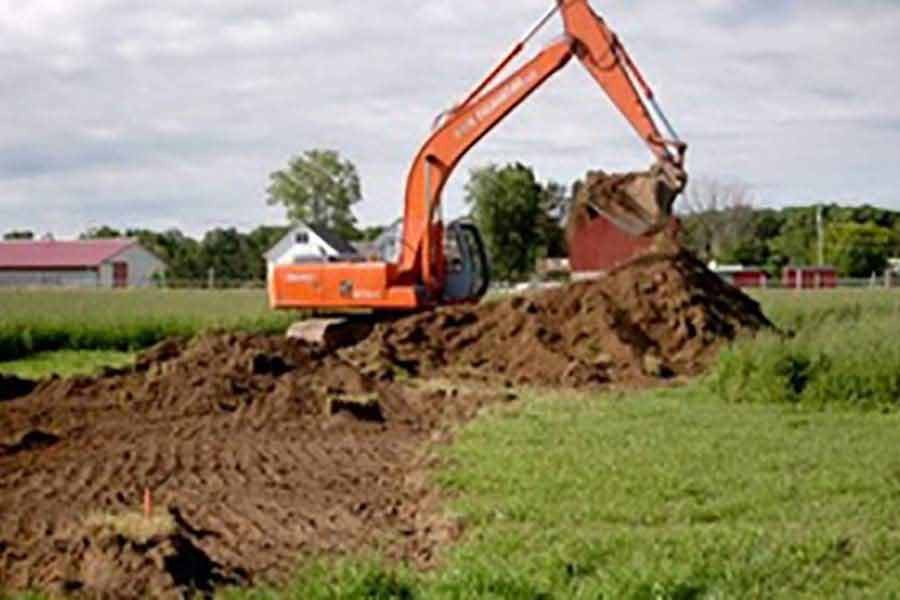'No sky is (visible) here, neither is any air here,' says the lyrics (Ekhane akash nei, ekhane batash nei) of an old Bangla song which narrates a city made up of bricks as lifeless. It's the city which is devoid of peace and tranquility and where man seeks freedom from darkness.
The allegories have turned into grimmer realities over the decades. Our cities have grown in an unplanned manner and are often dubbed 'slums of concretes' and 'jungle of bricks'. The fallout of injustice done to the nature, in Dhaka and elsewhere in the underdeveloped world, are reflected in loss of illusions of comforts in urban life today.
Such a flawed model of development is now being replicated in rural Bangladesh as well. Thousands of concrete structures including houses of 'scorched earth' are seen in roadside villages and more are being constructed without planning proper, let alone regulation. Most of them look ugly that contrasts a beautiful landscape. It's alarming to think how major portion of the countryside would look like and how people would live there.
In and around Dhaka city, urbanisation has caused near death of marshland and water bodies and in villages, farmland and open spaces are being transformed into sheer artificial establishments. There are no concerns as to how the process would affect people's living conditions, crop and non-crop production and livelihoods in the near future.
All the ills like drugs, extortion, bribery, price manipulation and pollutions that plague urban life and governance patterns are being imported to the rural areas. The mufassil (semi-rural, peri-urban) areas already lack in quality education and other facilities.
In those areas, for example, why would an aspiring chairman of a Union Parishad, which has a budget of hardly Tk 1.0 million, would spend Tk 20 million unless s/he has income prospects from 'collateral' earnings? That says how the moneyed men from the locality or outside, grab the land and turn it into whatever s/he likes.
Whereas the rural people are trying to make life better by raising income through remittances, small business, value-added agriculture and also higher wages, they have no good examples of how they would build living houses that won't harm their neighbours and neighbourhood. And the authority, given to certain quarters to protect ecology and farmland, can be compared with, in the light of an old adage, the small farmer's mistake of handing over responsibility of rearing poultry birds to a fox.
Bangladesh has been uniquely blessed with the most fertile land on earth, developed over the centuries through deposition of silts of rivers flowing from the Himalayan region. It is also challenged with the task of feeding a high population of 170 million or so, living on a small landmass.
The country should have formulated and enforced the best land use policy in the world in order to save the scarce and extremely critical land resources. A well-thought out rural housing policy and its implementation could have contributed to reclaiming and retaining agricultural land as the dire necessity to ensure national food security.
Instead, the nation has lost 870,000 hectares of farmland in half a century and is still losing it at a rate of 1.0 per cent a year. Not just shrinking of farming area but also building of hard structures on soft soil and its reckless use otherwise are damaging the entire atmosphere and prospects of production of varieties of crops, vegetables and fruits.
One may find a rosy picture in quadrupling of grain production since independence. By the same token, the situation suggests Bangladesh might have by this time reached the peak of its farm output through farm modernisation and mechanisation.
So, what next awaits our nation? Unless the trend of loss of cultivable land is reversed, the country may not be able to meet the needs of foods with domestic outputs. Over-enthusiasts argue you can buy foods from the world market if you have money, particularly foreign exchange earned from export proceeds and remittance earning.
However, the Ukraine war shows how uncertain availability of foods could be if a nation is not self-sufficient. The same crisis was proven during the 2007-08 food crisis and the year 1974 remains a nightmare for Bangladesh because of the famine then.
Many nations face difficulties in producing crops while it's easy to grow more foods in Bangladesh. A prudent policy with good governance is required to protect the country's invaluable arable land for present and future generations.


